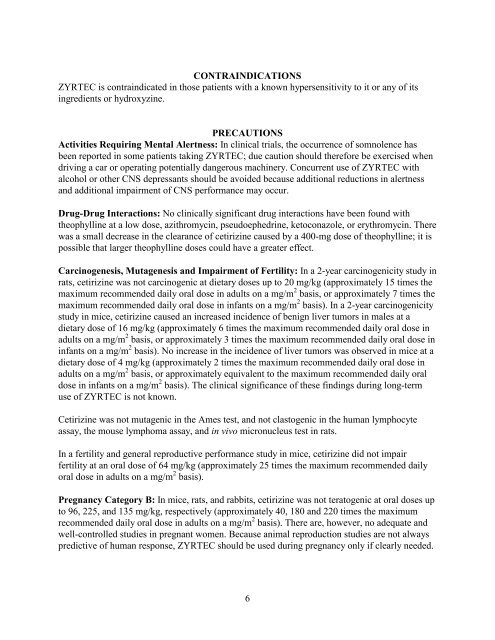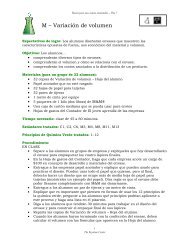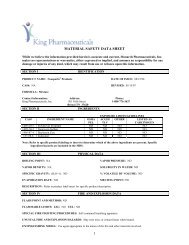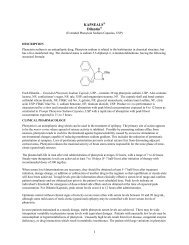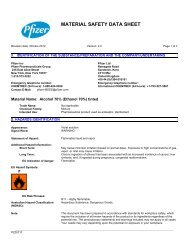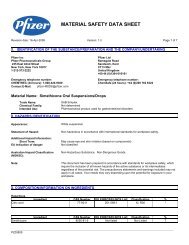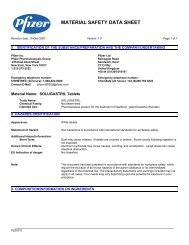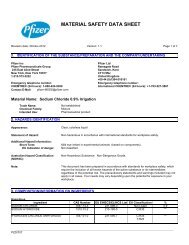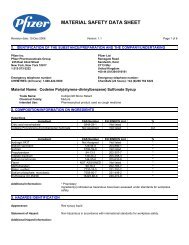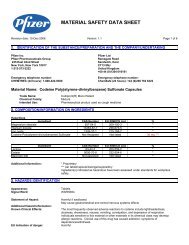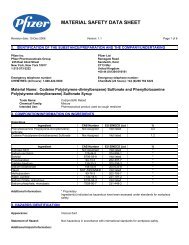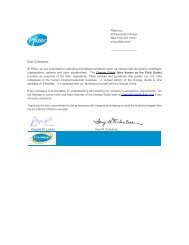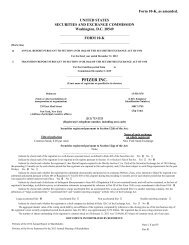ZYRTEC® (cetirizine Hydrochloride) Tablets, Chewable ... - Pfizer
ZYRTEC® (cetirizine Hydrochloride) Tablets, Chewable ... - Pfizer
ZYRTEC® (cetirizine Hydrochloride) Tablets, Chewable ... - Pfizer
Create successful ePaper yourself
Turn your PDF publications into a flip-book with our unique Google optimized e-Paper software.
CONTRAINDICATIONS<br />
ZYRTEC is contraindicated in those patients with a known hypersensitivity to it or any of its<br />
ingredients or hydroxyzine.<br />
PRECAUTIONS<br />
Activities Requiring Mental Alertness: In clinical trials, the occurrence of somnolence has<br />
been reported in some patients taking ZYRTEC; due caution should therefore be exercised when<br />
driving a car or operating potentially dangerous machinery. Concurrent use of ZYRTEC with<br />
alcohol or other CNS depressants should be avoided because additional reductions in alertness<br />
and additional impairment of CNS performance may occur.<br />
Drug-Drug Interactions: No clinically significant drug interactions have been found with<br />
theophylline at a low dose, azithromycin, pseudoephedrine, ketoconazole, or erythromycin. There<br />
was a small decrease in the clearance of <strong>cetirizine</strong> caused by a 400-mg dose of theophylline; it is<br />
possible that larger theophylline doses could have a greater effect.<br />
Carcinogenesis, Mutagenesis and Impairment of Fertility: In a 2-year carcinogenicity study in<br />
rats, <strong>cetirizine</strong> was not carcinogenic at dietary doses up to 20 mg/kg (approximately 15 times the<br />
maximum recommended daily oral dose in adults on a mg/m 2 basis, or approximately 7 times the<br />
maximum recommended daily oral dose in infants on a mg/m 2 basis). In a 2-year carcinogenicity<br />
study in mice, <strong>cetirizine</strong> caused an increased incidence of benign liver tumors in males at a<br />
dietary dose of 16 mg/kg (approximately 6 times the maximum recommended daily oral dose in<br />
adults on a mg/m 2 basis, or approximately 3 times the maximum recommended daily oral dose in<br />
infants on a mg/m 2 basis). No increase in the incidence of liver tumors was observed in mice at a<br />
dietary dose of 4 mg/kg (approximately 2 times the maximum recommended daily oral dose in<br />
adults on a mg/m 2 basis, or approximately equivalent to the maximum recommended daily oral<br />
dose in infants on a mg/m 2 basis). The clinical significance of these findings during long-term<br />
use of ZYRTEC is not known.<br />
Cetirizine was not mutagenic in the Ames test, and not clastogenic in the human lymphocyte<br />
assay, the mouse lymphoma assay, and in vivo micronucleus test in rats.<br />
In a fertility and general reproductive performance study in mice, <strong>cetirizine</strong> did not impair<br />
fertility at an oral dose of 64 mg/kg (approximately 25 times the maximum recommended daily<br />
oral dose in adults on a mg/m 2 basis).<br />
Pregnancy Category B: In mice, rats, and rabbits, <strong>cetirizine</strong> was not teratogenic at oral doses up<br />
to 96, 225, and 135 mg/kg, respectively (approximately 40, 180 and 220 times the maximum<br />
recommended daily oral dose in adults on a mg/m 2 basis). There are, however, no adequate and<br />
well-controlled studies in pregnant women. Because animal reproduction studies are not always<br />
predictive of human response, ZYRTEC should be used during pregnancy only if clearly needed.<br />
6


